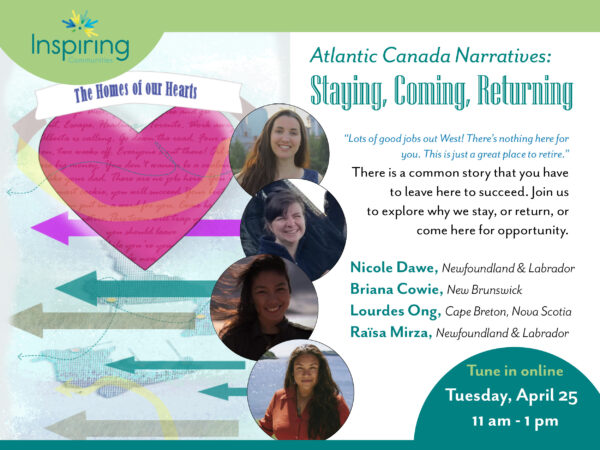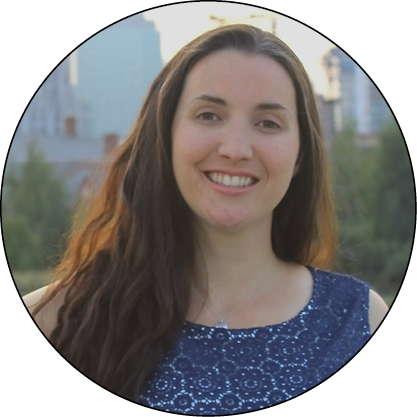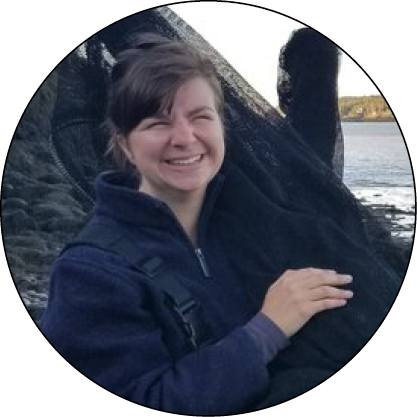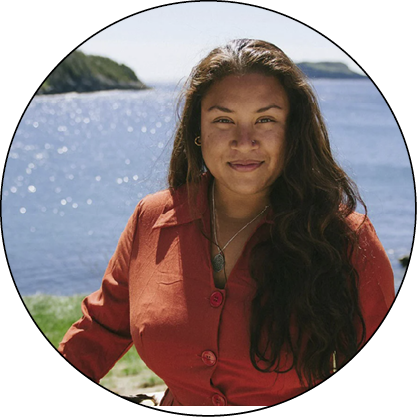April 25 Panel: Atlantic Canada Narratives – Staying, Coming, Returning
WATCH THE RECORDING NOW
There is a common story shared across our Atlantic Provinces. We have spent decades telling our children that they would have to move away to succeed. The movie “Going Down the Road” from 1970 was an early reflection on this truth, a film co-written and produced by Don Shebib, a Toronto-born filmmaker whose father was from Sydney, NS and whose mother was a Long from Newfoundland.
This story then became the perennial “brain drain” panic among news media and politicians, as in this 2013 Globe and Mail article. Who will be here to pay taxes and take care of us when we are old?
Many did flee to far-flung locales, but found the draw homeward was deeply planted, and wound through their cultural lives: like this anthem to Cape Breton, or this song from Newfoundland’s Rum Ragged, or even this classic that nods to PEI’s “red, red mud.” Many of the songs and other cultural works draw on the original Scottish, Irish and French settler’s longing for their homes across the sea.
“Kjeld Mizpah (KJ) Conyers-Steede, an Inspiring Communities Fellow, asked a really powerful question in a session he facilitated recently – “When was the first time you were told you needed to leave this place (Atlantic Canada) to have success?”
I have a clear memory of sitting in my classroom in grade 5 and telling everyone, “I’ll have a lot more opportunities there (Halifax).” This doesn’t feel like something a 10-year-old observes on their own without influence. How can we create a prosperous future for ourselves and this place within a story that tells us we need to leave?
Where does all of this grow from? A multitude of places and many that are still to be uncovered for me and for others. We live in colonial places and within a consumer story and white supremacy culture. How do we explore and deconstruct these stories that we hold within ourselves and more broadly in our communities?”
Nicole Dawe, Finding Enough
So, with more Atlantic Canadians moving home and forging a new path in this place, what is the new narrative? How do these narratives speak to our new settlers, the immigrants and newcomers who have chosen to move here? What does all of that mean for those who never left? And how do these settlers connect with reconciliation and the recognition that the Mi’kmaq, Maliseet, Passamaquoddy, Beothuk, Inuit and Innu peoples lived on this land thousands of years before us?
What does it mean to be “of” a place? What is “belonging”?
Through personal story sharing and discussion, we will explore these narratives about our place in the world, and this place in our hearts.

Panelists
Nicole Dawe
Nicole is a proud Newfoundlander and Labradorian who is raising her daughter and building a life with her partner in the province. Nicole was raised in a multi-generational community and has been working to create communities of care in her personal and professional life ever since. Nicole enjoys listening to what’s on people’s hearts and finding opportunities to make connections and pollinate between people, ideas and resources in the communities she works in. Nicole is fortunate to have played a role in the journeys of many charities and nonprofits, most often bringing together groups of people to support and resource ambitious community work. She is currently stewarding the Community Foundation of Newfoundland and Labrador and being curious about how to involve more people in becoming co-authors of their community and economy.

Des Ong

Originally from Manila, Philippines, Des came to Canada in 2019 and completed her post-graduate studies in Business Management in 2021. Des was also one of the participants of the Northside Changemakers Program. Now she is the Communications Coordinator for Inspiring Communities. Before coming to Canada, Des was working in advertising, public relations and was also a creative entrepreneur. Des volunteers for the Cape Breton Local Immigration Partnership specifically supporting the Immigrant Advisory Table.
Brianna Cowie
Briana has worked on research projects ranging from mapping cultural ecosystem services for the North Shore Micmac District Council, helping to find a cohesive environmental governance system for the Gulf of St. Lawrence region as well as contributing to frameworks for full-spectrum sustainability in the Arctic region. Her proudest project to date is the Southwest New Brunswick Climate Hub – a tool for practitioners and service providers in our region.

Recognizing the interconnectedness between environmental management and a collective sense of community, she has also volunteered as a member of the Charlotte County Multicultural Association, Vibrant Communities Charlotte County, the Sackville Refugee Response Coalition, and the Mount Allison Indigenous Support Group. She is currently the Vice Chair of the New Brunswick Watershed Caucus and has presented on multiple panels with the National Climate Caucus, the GovMakers Conference and most recently spoke on Parliament Hill about climate impacts to the fisheries industry. She has also worked to co-publish the NRCAN Atlantic Canada Adaptation Assessment chapter for Climate Change with 50+ other national researchers.
With a background in political science, international relations and environmental policy, she has worked for ECW since 2018, first as the Climate Change Program Manager, and now as the Executive Director. Here she works with a brilliant team to help design a more sustainable, resilient southwest New Brunswick. She now lives in St. Stephen, New Brunswick with her fiance Xander and 2 cats.
MODERATOR: Raïsa Mirza

Raïsa is a human-centered designer, researcher, facilitator and socially engaged artist with experience implementing and co-creating participatory systems strengthening programs in over 20 countries in a variety of sectors and roles supporting the Sustainable Development Goals.